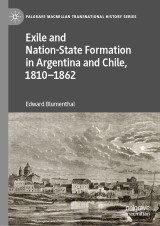Details

Exile and Nation-State Formation in Argentina and Chile, 1810-1862
Palgrave Macmillan Transnational History Series
|
90,94 € |
|
| Verlag: | Palgrave Macmillan |
| Format: | |
| Veröffentl.: | 23.10.2019 |
| ISBN/EAN: | 9783030278649 |
| Sprache: | englisch |
Dieses eBook enthält ein Wasserzeichen.
Beschreibungen
This book traces the impact of exile in the formation of independent republics in Chile and the Río de la Plata in the decades after independence. Exile was central to state and nation formation, playing a role in the emergence of territorial borders and Romantic notions of national difference, while creating a transnational political culture that spanned the new independent nations. Analyzing the mobility of a large cohort of largely elite political émigrés from Chile and the Río de la Plata across much of South America before 1862, Edward Blumenthal reinterprets the political thought of well-known figures in a transnational context of exile. As Blumenthal shows, exile was part of a reflexive process in which elites imagined the nation from abroad while gaining experience building the same state and civil society institutions they considered integral to their republican nation-building projects.
1. Introduction: The Floating Province of Exile.- 2. Political Displacement and Independence: Commerce, Indigenous Peoples and Exile (1810–1839).- 3. Epistolary Exchange and the Exile Experience: Transnational Networks before the Nation.- 4. Political Exile, Labor Markets and Institution Building.- 5. The Practice and Politics of Exile: Nation-State Formation from Abroad.- 6. Exile Representations of Chilean Exceptionalism.- 7. Narratives of Exile, Narratives of Nationhood.- 8. Floating Provinces: Exile and the Formation of Independent Republics.
<b>Edward Blumenthal</b> is Assistant Professor of Latin American Studies at the Université Sorbonne Nouvelle Paris 3, France.
This book traces the impact of exile in the formation of independent republics in Chile and the Río de la Plata in the decades after independence. Exile was central to state and nation formation, playing a role in the emergence of territorial borders and Romantic notions of national difference, while creating a transnational political culture that spanned the new independent nations. Analyzing the mobility of a large cohort of largely elite political émigrés from Chile and the Río de la Plata across much of South America before 1862, Edward Blumenthal reinterprets the political thought of well-known figures in a transnational context of exile. As Blumenthal shows, exile was part of a reflexive process in which elites imagined the nation from abroad while gaining experience building the same state and civil society institutions they considered integral to their republican nation-building projects.
Analyzes the role of exile in state and nation formation in nineteenth-century Latin America, focusing on Chile and the Río de la Plata Contextualizes the political thought of a group of important political and cultural figures from Chile and Argentina by studying them as émigrés Examines nation building in Latin America after independence through the lens of transnational processes of exile and migration
“This is a magnificent, original book about the centrality of exile to the making of nation-states in South America. It tracks the experiences, networks and agonies of forced displacement and shows how preeminent figures in Argentine and Chilean public life drew upon exile to reimagine home.” (Jeremy Adelman, Henry Charles Lea Professor of History and Director of the Global History Lab, Princeton University, USA)<p>“An original and important study of the founding generations of South American politics and letters. A compelling book that shows how forced territorial displacement played a key role both in the construction of nation-states and the transnational dynamics of South America beyond national borders. Through his analysis of the social history, correspondence networks and intellectual trajectory of early nineteenth-century Argentine and Chilean political exiles, Edward Blumenthal makes a crucial empirical and theoretical contribution to comparative historical and cross-nationalstudies. Highly recommended.” (Luis Roniger, Reynolds Professor of Latin American Studies, Wake Forest University, USA)</p>
<p>“This book narrates a solid and original transnational history of political mobilities in the nineteenth century, based on a connected history of exile experiences in the Southern Cone. Beginning with a rich corpus, Blumenthal analyzes little-studied aspects such as the constitution of a transnational political and professional market. It is indispensable reading for those who wish to better understand transnational dynamics of nation-state building in the nineteenth century.” (Pilar González,Professor of Latin American History, Université Paris 7 Diderot, France)</p>
<p>“This book narrates a solid and original transnational history of political mobilities in the nineteenth century, based on a connected history of exile experiences in the Southern Cone. Beginning with a rich corpus, Blumenthal analyzes little-studied aspects such as the constitution of a transnational political and professional market. It is indispensable reading for those who wish to better understand transnational dynamics of nation-state building in the nineteenth century.” (Pilar González,Professor of Latin American History, Université Paris 7 Diderot, France)</p>
Diese Produkte könnten Sie auch interessieren:

The Last Samurai - Japanische Geschichtsdarstellung im populären Kinofilm

von: Daniel Scherrer

34,99 €















